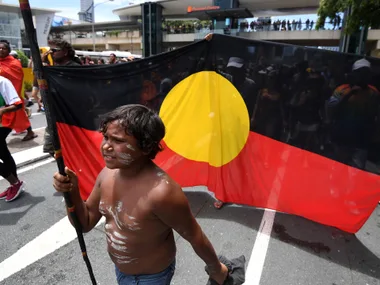Just like every year, you’ve probably been asked umpteen times how you feel about changing the date of Australia Day.
Perhaps you’ve dismissed the question completely or prefer to keep things going the way they are, but it’s an issue, albeit a divisive one, coming up too frequently to ignore.
With 26 January looming ever closer, the Greens have now thrown their full support behind changing the date of Australia Day.
Greens leader Richard Di Natale told over 100 of the party’s local government councillors he’ll provide them with support and resources to launch campaigns to move the date.
“All Australians want a day on which we can come together and to celebrate our wonderfully diverse, open and free society, but January 26 is not that day,” Senator Di Natale said.
With Victoria councils Yarra, Darebin and Freemantle already shifting celebrations away from 26 January, it might not be long before other councils follow suit. Indeed, there’s been growing momentum across the country.
Greens Acting Co-Deputy Leader and spokesperson for Aboriginal & Torres Strait Islander Issues, Rachel Siewert, spoke to The Weekly about the significance of changing the date and having a day that’s inclusive of all Australians.

Richard Di Natale and Rachel Siewert. Source: The Australian Greens
“For decades the 26th of January has been regarded as a day of invasion, mourning and grieving,” explains Senator Siewert.
“This need for change isn’t a new thing as some politicians would have you believe – it’s something Indigenous Leaders have campaigned for since the 1930s.
“We want a date that inclusive for all Australians.”
Those who support changing the date of Australia Day
A united Australia is certainly the most compelling argument for the date change.
“On Australia Day, there are citizenship ceremonies taking place all over the country – these should be reflective of how diverse Australia is rather than marred by sorrow,” Senator Siewert told The Weekly.
“We need to acknowledge Australia Day isn’t a day everyone can celebrate and the actual date of January 26 has only been a public holiday since the ’90s – there shouldn’t be an attachment to the date itself.”
Along with the three Victorian councils who no longer acknowledge the date, radio station Triple J has moved its ‘Hottest 100’ – which has become synonymous with Australia Day for some – to be the ‘Hottest 100 Weekend’ every fourth weekend in January.
Senator Siewert agrees this is a significant move, particularly as young people seem to be driving the change.
“The younger generations see it in simple terms: Why don’t we just change the date? Obviously Triple J’s Hottest 100 has been changed because the feedback they received was clear and they did it quite comprehensively.
“We’ve been amazed by how many young people want the date to be changed and how they recognise we’re not united in celebration.”
Tennis legend Pat Cash recently revealed he won’t be acknowledging the current date of Australia Day, telling the Today show he was reduced to tears when working with Aboriginal charities and witnessing cases of poverty (you can watch at the top).
“I was out of the country for 30 years I had no idea how bad the situation is,” Cash said.
“I’ve got to say I was embarrassed to be Australian, I was shocked. It was mind-blowing. I was in tears half the time seeing the poverty and the situation these people are in.”
Today show host Karl Stefanovic was initially someone who thought Australia Day should be ‘left alone’.
“Indigenous and Torres Strait Islanders, this is our day, all of us. Everyone come together. Commemorate but also celebrate. After all, that’s what we do on Anzac Day,” he began.
“But I’ve changed my mind. Having spoken to several people from those communities, I empathise. As hard as some want to ignore it, January 26 marks a day this land changed forever for one of the oldest and most beautiful cultures in the world.
The host referred to the traumatic history of Indigenous Australians, including current disparities between their health and that of other Australians.
“To this day, mortality rates for indigenous and Torres Strait islanders are alarming. It wasn’t until March 1962 the Menzies government finally gave the right to vote for all aboriginal people. We look back at the horror of the Stolen Generation … Earlier in the 20th century, the White Australia Policy, then we look at what happened in Tasmania,” he explained.
“They are all facts and all incredibly painful. If we are to truly follow through with the apology and move forward together hand in hand, arm in arm, then I believe it must change. So let’s do it together. Certainly let’s debate it together.”
What would the date of Australia Day be changed to?
This is still up for debate but there has been a lot of support for Federation Day – 1 January. “I personally think changing to this date has a certain elegance to it but it’ll be interesting to see how the conversation unfolds,” Senator Siewert reveals.
There’s also been a show of support for May 8 – get it – “Mate”. Aussie as!
Opposition to changing the date of Australia Day
Opposition for the date change is coming straight from the top. Prime Minister Malcolm Turnbull has rejected calls to change the date of Australia Day.
“I’m disappointed by those who want to change the date of Australia Day, seeking to take a day that unites Australia and Australians and turn it into one that would divide us,” Mr Turnbull said in a Facebook video.
This is the polar opposite of the Greens’ argument – they say changing the date will unite Australians and keeping it as 26 January will continue to divide us.
The debate will most certainly keep raging on – which side are you?



